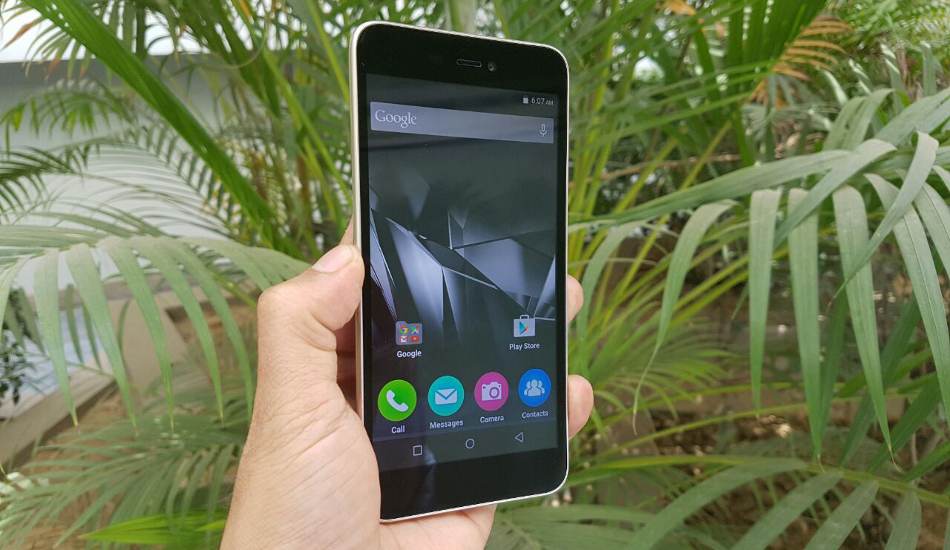Micromax Canvas Spark 3 Q385 was launched in March 2016 at Rs 4,999 and it is available from Snapdeal through flash sale model. Despite bring priced so low, the phone offers a big 5.5 inch screen, quad core processor, 8-megapixel rear camera, 5-megapixel front camera, and dual SIM.
Design
The Micromax Canvas Spark 3 comes in black colour front and back panels while the side rim is in golden colour. The combination of black and gold colour really looks quite good. In the back panel, the camera module has a silver colour thread around it; the Micromax logo is also in silver colour, contrasting well to the carbon black colour of the back panel. Hence from the looks atleast, you cannot term it as an affordable phone.
The Spark 3 has a removable plastic back panel, metal rim, and a 5.5 inch screen. The phone is easy to hold because of its curved side panels, slim profile and rubberized finished back cover. Under the back cover lies two SIM slots, a micro SD card slot and a battery which is non-removable.
The power and volume key are on the right hand side. A 3.5 mm Audio Jack is at the top while a Micro USB port is at the bottom. A microphone is also located beside the micro USB port for noise cancellation.
Overall, I liked the look and feel of Spark 3. Though I feel that the phone has some unnecessary bezel (the bezel under the display does not have any touch keys either) but still I am contend with its design which I think is great for an affordable phone.
Display
The Micromax Canvas Spark 3 has a huge 5.5 inch touchscreen – good enough for watching movies and play games on the go. With high definition or 1280×720 pixels resolution, it offers good Pixel density as well. The IPS screen has good viewing angles. It has just enough brightness for outdoors but not all will find it sufficient.
The screen though didn’t feel responsive enough. I felt there was a slight lag between input and result. The screen also isn’t scratch or shatter proof, so better use a tempered glass.
OS and UI
The Micromax Canvas Spark 3 has Android Lollipop 5.1 operating system but comes with a customized skin that brings a different layout with App fonts. There was no app drawer; everything is in the home screen itself. However, all other Android UI features are intact.
Micromax however stuffed it with many applications, few of which you can uninstall. But I don’t get the necessity of App Bazar – a Google Play Store like application store from where you can install apps from. But the App Bazar offers the same apps and games which are also available from Google Play store. Sometimes it complicates things.
For instance, I had downloaded Whatsapp Messenger from Google Play store but I used to get notification from the App Bazar to update the Whatsapp.
Camera
The Spark 3 has an 8 Megapixel rear camera and a 5 megapixel front camera. There is an LED flash in its rear panel for illumination. The rear camera has HDR feature. But that’s all about it. Though the cameras produce decent pictures for such an affordable phone but don’t keep high hopes. The cameras won’t disappoint you in good lighting and from a close up distance. But in low light, the images captured have too much noise.
Performance
The Micromax Canvas Spark 3 has 1 GB of RAM and a 1.3 GHz quad core processor. The combination gives decent performance and can run normal games like Temple Run. But the phone lags if few apps are running in the background. I had to clear background tasks regularly during the review.
Micromax Canvas Spark 3 has a 2500 mAh battery which manages to offer decent backup. During my review, with dual SIM and constant WiFi/3G connectivity, it managed to offer around 7-8 hours of back up which is quite appreciable.
As far as storage is concerned, the Spark 3 has 8 GB of internal storage and a dedicated expandable storage slot which can accommodate a micro SD card of 32 GB capacity.
There were no issues with connectivity features of Spark 3. I had no issues while using two SIMs, or with its Bluetooth or with its WiFi.


